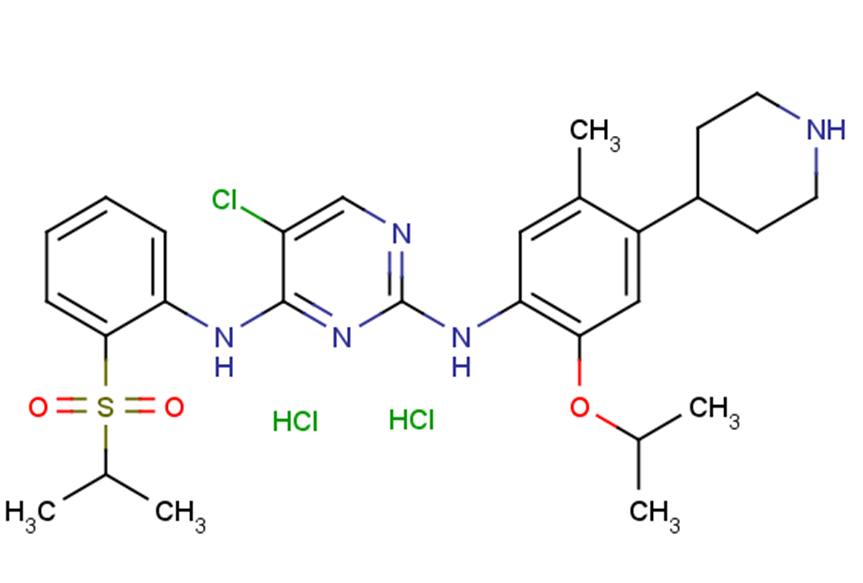
LDK378 dihydrochloride
CAS No. 1380575-43-8
LDK378 dihydrochloride( Ceritinib dihydrochloride )
Catalog No. M22108 CAS No. 1380575-43-8
Ceritinib dihydrochloride is a selective, orally bioavailable and ATP-competitive inhibitor of ALK tyrosine kinase(IC50 of 200 pM), and also inhibits IGF-1R, InsR, and STK22D (IC50 values of 8, 7, and 23 nM, respectively).
Purity : >98% (HPLC)
 COA
COA
 Datasheet
Datasheet
 HNMR
HNMR
 HPLC
HPLC
 MSDS
MSDS
 Handing Instructions
Handing Instructions
| Size | Price / USD | Stock | Quantity |
| 5MG | 39 | In Stock |


|
| 10MG | 52 | In Stock |


|
| 50MG | 77 | In Stock |


|
| 100MG | 113 | In Stock |


|
| 200MG | Get Quote | In Stock |


|
| 500MG | Get Quote | In Stock |


|
| 1G | Get Quote | In Stock |


|
Biological Information
-
Product NameLDK378 dihydrochloride
-
NoteResearch use only, not for human use.
-
Brief DescriptionCeritinib dihydrochloride is a selective, orally bioavailable and ATP-competitive inhibitor of ALK tyrosine kinase(IC50 of 200 pM), and also inhibits IGF-1R, InsR, and STK22D (IC50 values of 8, 7, and 23 nM, respectively).
-
DescriptionCeritinib dihydrochloride is a selective, orally bioavailable and ATP-competitive inhibitor of ALK tyrosine kinase(IC50 of 200 pM), and also inhibits IGF-1R, InsR, and STK22D (IC50 values of 8, 7, and 23 nM, respectively), shows great antitumor potencyIn vitro experiments also showed that lipopolysaccharide (LPS)-induced migration of MDSCs was similarly owing to the activation of GRK2 and upregulation of CCR2 by LPS, whereas the treatment with LDK378 partially blocked the LPS-induced phosphorylation of p38 and GRK2 and decreased the expression of CCR2 on the cell surface, therefore leading to the suppression of MDSC migration[1].?LDK378 significantly improved the survival of CLP-induced polymicrobial septic mice, which was paralleled by reduced organ injury, decreased release of inflammatory cytokines and decreased recruitment of MDSCs to the spleen.?Importantly, LDK378 inhibited the migration of MDSCs to the spleen by blocking the CLP-mediated upregulation of CC chemokine receptor 2 (CCR2), a chemokine receptor critical for the recruitment of MDSCs.?Mechanistically, LDK378 treatment blocked the CLP-induced CCR2 upregulation of MDSCs via partially inhibiting the phosphorylation of p38 and G-protein-coupled receptor kinase-2 (GRK2) in bone marrow MDSCs of septic mice.(In Vitro):Ceritinib (LDK378) shows great anti-proliferative activity in Ba/F3-NPM-ALK and Karpas290 cells with IC50 of 26.0 nM and 22.8 nM, compared with IC50 of 319.5 nM and 2477 nM in Ba/F3-Tel-InsR and Ba/F3-WT cells.(In Vivo):Ceritinib (LDK378) is designed to reduce the possibility of forming reactive metabolites and shows undetectable levels of glutathione (GSH) adducts (<1%) in liver microsomes. Ceritinib (LDK378) has relatively good metabolic stability, with moderate CYP3A4 (Midazolam substrate) inhibition and hERG inhibition. Ceritinib (LDK378) exhibits low plasma clearance in animals (mouse, rat, dog and monkey) compared to liver blood flow, with the oral bioavailability of above 55% in mouse, rat, dog and monkey. Ceritinib (LDK378) induces a dose-dependent growth inhibition and tumor regression in the Karpas299 and H2228 rat xenograft models, with no body-weight loss. Ceritinib (LDK378) shows no impact on insulin levels or plasma glucose utilization in the mouse upon chronic dosing up to 100 mg/kg.
-
In VitroCeritinib (LDK378) shows great anti-proliferative activity in Ba/F3-NPM-ALK and Karpas290 cells with IC50 of 26.0 nM and 22.8 nM, compared with IC50 of 319.5 nM and 2477 nM in Ba/F3-Tel-InsR and Ba/F3-WT cells.
-
In VivoCeritinib (LDK378) is designed to reduce the possibility of forming reactive metabolites and shows undetectable levels of glutathione (GSH) adducts (<1%) in liver microsomes. Ceritinib (LDK378) has relatively good metabolic stability, with moderate CYP3A4 (Midazolam substrate) inhibition and hERG inhibition. Ceritinib (LDK378) exhibits low plasma clearance in animals (mouse, rat, dog and monkey) compared to liver blood flow, with the oral bioavailability of above 55% in mouse, rat, dog and monkey. Ceritinib (LDK378) induces a dose-dependent growth inhibition and tumor regression in the Karpas299 and H2228 rat xenograft models, with no body-weight loss. Ceritinib (LDK378) shows no impact on insulin levels or plasma glucose utilization in the mouse upon chronic dosing up to 100 mg/kg.
-
SynonymsCeritinib dihydrochloride
-
PathwayAngiogenesis
-
TargetALK
-
RecptorALK
-
Research AreaCancer
-
IndicationSoft Tissue Sarcoma
Chemical Information
-
CAS Number1380575-43-8
-
Formula Weight631.06
-
Molecular FormulaC28H38Cl3N5O3S
-
Purity>98% (HPLC)
-
SolubilityH2O:170 mg/mL (269.39 mM); DMSO:95 mg/mL (150.54 mM; Need ultrasonic)
-
SMILESCl.Cl.CC(C)Oc1cc(C2CCNCC2)c(C)cc1Nc1ncc(Cl)c(Nc2ccccc2S(=O)(=O)C(C)C)n1
-
Chemical Name——
Shipping & Storage Information
-
Storage(-20℃)
-
ShippingWith Ice Pack
-
Stability≥ 2 years
Reference
1. Hu J , Zhang W , Liu Y , et al. LDK378 inhibits the recruitment of myeloid‐derived suppressor cells to spleen via the p38–GRK2–CCR2 pathway in mice with sepsis[J]. Immunology and Cell Biology, 2019.
molnova catalog



related products
-
SB-505124 hydrochlor...
SB-505124 hydrochloride (SB505124 hydrochloride) is an orally available, selective and potent inhibitor of TGF-β type I receptors (ALK4, ALK5, ALK7) with IC50 values of 129 nM and 47 nM for ALK4 and ALK5, respectively.
-
Wy 49051
Wy 49051 is an orally active antagonist of H1 receptor(IC50 of 44 nM).
-
LDN212854
LDN-212854 is a novel BMP inhibitor that exhibits substantially greater selectivity for BMP versus the TGF-β type I receptors.



 Cart
Cart
 sales@molnova.com
sales@molnova.com


